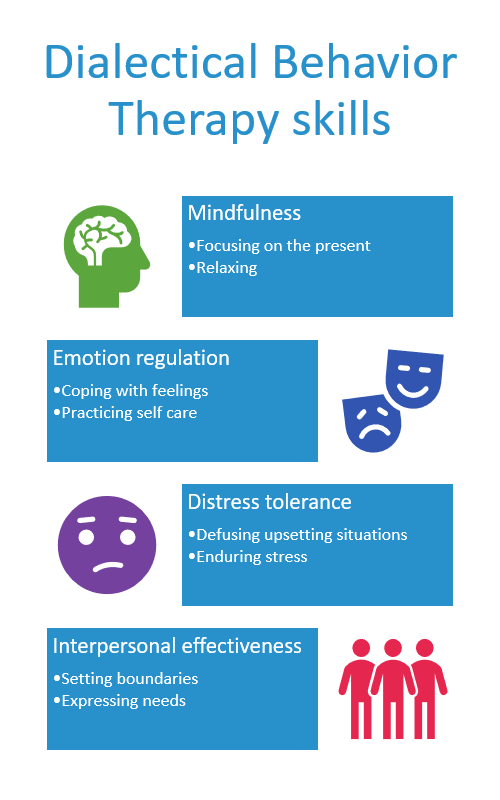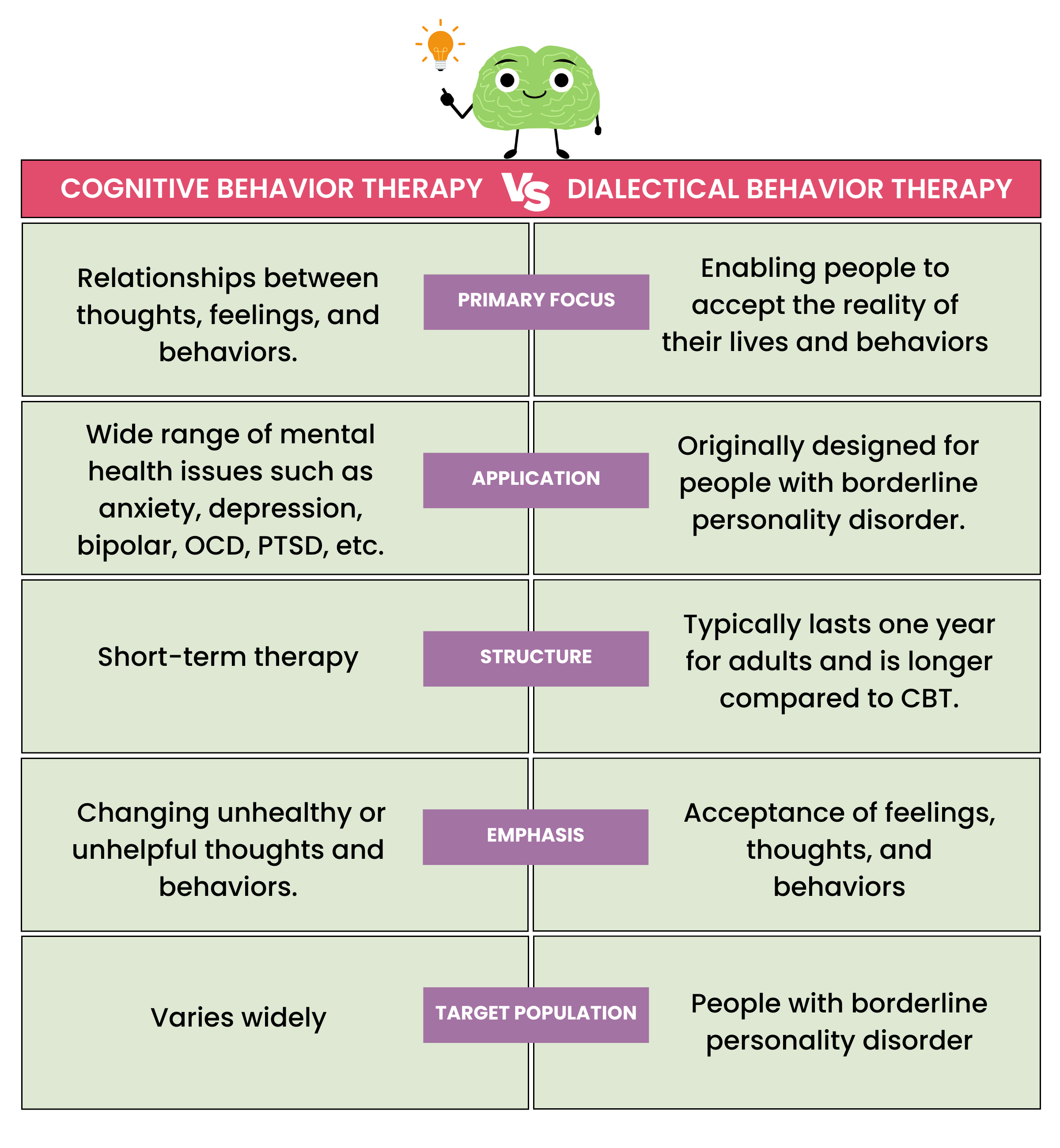Empowerment Through DBT London: Building Durability, Searching For Balance
Wiki Article
Equipping Individuals With Reliable Dialectical Practices Therapy (DBT) Providers: Building Stronger Mental Health And Wellness Foundations
In the realm of mental health and wellness, the importance of encouraging individuals via effective Dialectical Behaviour Treatment (DBT) solutions can not be overemphasized. By concentrating on the core principles of DBT, such as improving psychological law abilities, boosting interpersonal efficiency, building distress resistance methods, and growing mindfulness practices, individuals can begin on a trip in the direction of building stronger mental wellness foundations.Comprehending the Core Principles of DBT


One core concept of DBT is recognition. Specialists utilizing DBT recognize the client's sensations and behaviors as legitimate actions to their environment. This validation aids build a solid healing partnership and urges clients to work in the direction of adjustment. One more essential facet is dialectics, which instructs people to check out scenarios from multiple viewpoints and find the synthesis between conflicting ideas or feelings.
In addition, the concept of dialectical abstaining is central to DBT. This concept encourages individuals to avoid self-destructive actions while also approving themselves. By comprehending and integrating these core principles, specialists can properly implement DBT techniques and assistance individuals in their trip in the direction of emotional guideline and psychological wellness.
Enhancing Emotional Regulation Abilities
Creating proficiency in managing feelings is an essential aspect of cultivating mental wellness and social efficiency - DBT London. Enhancing emotional policy skills is a core part of Dialectical Practices Treatment (DBT) that gears up individuals with the tools to browse extreme feelings in a healthy and positive fashion. With DBT, individuals discover to identify, comprehend, and regulate their emotions, resulting in improved psychological wellness outcomesDBT emphasizes the significance of mindfulness, which includes being existing in the minute without judgment. This practice enables individuals to observe their feelings without coming to be bewildered by them, improving their ability to react properly instead of react impulsively. By cultivating mindfulness, people can establish a greater feeling of self-awareness and psychological control.
Moreover, DBT instructs practical abilities such as distress tolerance and feeling regulation techniques to assist people handle challenging emotions. By learning these abilities, individuals can lower impulsive actions, enhance decision-making, and reinforce their partnerships with others. Ultimately, boosting emotional law skills via DBT equips individuals to lead even more fulfilling and well balanced lives.

Improving Interpersonal Efficiency
Having actually developed a solid structure in psychological policy abilities within the framework of Dialectical Behavior Therapy (DBT), the focus now shifts towards enhancing interpersonal effectiveness. Improving interpersonal performance is an important part of DBT as it gears up people with the essential abilities to navigate social interactions, communicate properly, established limits, and develop healthier relationships.
In DBT, interpersonal efficiency abilities are shown through useful content modules that concentrate on locations such as assertiveness, effective interaction, and social analytical. By learning these abilities, people can boost their capacity to reveal their needs and requirements, maintain self-worth, and construct stronger links with others.
Practicing mindfulness is an essential component of improving interpersonal performance within the DBT framework. Mindfulness permits individuals to be present in their interactions, pay attention actively, and respond attentively rather than respond impulsively. By including mindfulness right into their daily lives, individuals can grow greater self-awareness and psychological regulation, which are crucial for successful interpersonal communications.
Building Distress Tolerance Strategies
Exploring reliable methods for taking care of psychological distress is important for individuals seeking to enhance their coping skills and resilience. Structure distress resistance techniques is a crucial aspect of Dialectical Behaviour Treatment (DBT) that encourages people to browse tough emotions without becoming overwhelmed.Moreover, mindfulness practices play a significant duty in building distress resistance. Mindfulness encourages people to remain present in the moment without judgment, allowing them to observe their ideas and emotions without reacting impulsively. This awareness enables people to endure distress extra properly and create a better sense of control over their reactions.
In addition to these techniques, developing a personalized distress resistance strategy with the support of a skilled therapist can provide people with a tailored method to taking care of psychological distress - DBT London. By integrating these techniques right into every day life, people can enhance their mental health and wellness foundations and boost their general well-being

Cultivating Mindfulness Practices
To grow their distress resistance techniques even more, individuals can concentrate on growing home mindfulness techniques as a complementary method within the structure of Dialectical Behaviour Therapy (DBT) Mindfulness, an essential element of DBT, involves focusing on today minute without judgment. By promoting mindfulness, people can boost their recognition of ideas, emotions, and bodily feelings, promoting a deeper understanding of themselves and their experiences.Mindfulness methods in DBT include methods such as conscious breathing, body scans, and observing ideas without add-on. These techniques urge people to establish a non-reactive position towards their inner experiences, allowing them to react to difficult circumstances with higher clearness and composure. By incorporating mindfulness into daily regimens, people can discover to manage their emotions a lot more properly, lower spontaneous habits, and cultivate a feeling of internal peace.
Through growing mindfulness methods, individuals undergoing DBT can construct a solid structure for handling tension, improving partnerships, and improving overall well-being. By incorporating mindfulness right into their therapeutic journey, individuals can establish valuable abilities that empower them to browse life's obstacles with durability and self-awareness.
Conclusion
Finally, efficient Dialectical Behavior Therapy (DBT) services play a critical function in empowering individuals to build stronger psychological wellness foundations. By understanding the core concepts of DBT, enhancing psychological regulation skills, improving social efficiency, developing distress tolerance methods, and cultivating mindfulness practices, people are furnished with the essential devices to browse their feelings, partnerships, and difficulties in a more flexible and resistant way. DBT solutions supply a detailed approach to advertising psychological wellness and equipping individuals to lead meeting lives.By focusing on the core concepts of DBT, such as boosting psychological law skills, boosting social performance, developing distress resistance techniques, and cultivating mindfulness techniques, people can embark on a journey in the direction of building stronger psychological health structures. Enhancing emotional guideline abilities is a core part of Dialectical Practices Therapy (DBT) that gears up people with the devices to navigate extreme feelings in a constructive and healthy way.Additionally, DBT teaches functional skills such as distress tolerance and feeling regulation strategies to aid individuals take care of tough feelings.To grow their distress tolerance strategies additionally, individuals can focus this link on growing mindfulness practices as a complementary approach within the structure of Dialectical Behavior Treatment (DBT) By comprehending the core concepts of DBT, boosting emotional policy skills, boosting interpersonal performance, constructing distress resistance strategies, and cultivating mindfulness methods, individuals are furnished with the essential devices to navigate their emotions, relationships, and challenges in a more resistant and adaptive way.
Report this wiki page